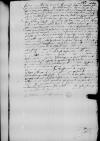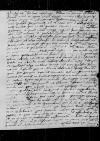List #2161
Ioannes DANTISCUS do Tiedemann GIESEHeilsberg (Lidzbark Warmiński), 1539-06-06, postscript 1539-06-09
Regest polski:
Dantyszek dziękuje Giesemu za słowa pociechy [po śmierci matki].
Podziela jego opinię w kwestii sejmu [pruskiego].
Na życzenie kasztelana gdańskiego [Achacego Cemy] Dantyszek napisał do króla [Zygmunta I] list polecający w sprawie jeziora Drużno, przy okazji prosząc o przełożenie sejmu [pruskiego] na dzień św. Michała [29 września].
Obszerniej sprawę wyłożył podkanclerzemu [Samuelowi Maciejowskiemu]. Doradził też kasztelanowi gdańskiemu, by wraz z wojewodą [malborskim Jerzym Bażyńskim] i innymi panami napisali do króla w tym samym duchu. Dantyszek chciałby, aby list ten został przysłany otwarty i opatrzony pieczęciami znaczniejszych panów — wyśle go przez swojego posła wraz z własnym.
Podobnie jak Giesemu, któremu odpisał jedynie kasztelan chełmiński [Mikołaj Działyński], żaden z panów nie odpisał Dantyszkowi [w sprawie przesunięcia terminu sejmu], odpowiedziała mu natomiast rada Elbląga, lękliwie opowiadając się za zachowaniem terminu 15 czerwca, o ile inni na to przystaną. Dantyszek zawiadomi Giesego o nadejściu kolejnych odpowiedzi.
Dantyszek nie wysłał napisanego 6 czerwca listu do Giesego błędnie oceniwszy plany posłańca. Tymczasem otrzymał kolejny list od rady m. Gdańska. Zgadza się ona z listem wojewody pomorskiego [Jerzego Konopackiego] skierowanym do Giesego. Dantyszek nie wątpi, że podzielą ich opinię również wojewoda malborski i kasztelan gdański, nie dba natomiast o zdanie wojewody chełmińskiego [Jana Luzjańskiego], który nie zwykł uczestniczyć w zjazdach. Jest też przekonany, że kasztelan elbląski [Ludwik Mortęski], poinstruowany przez innych, również złoży swój podpis.
W takim przeświadczeniu Dantyszek przygotował koncept listu od Giesego, wojewodów i kasztelanów do króla. Prosi, by Giese uzupełnił koncept wedle swojej woli i gotowe pismo, po jego podpisaniu i przyłożeniu pieczęci, wysłał pozostałym panom, on sam zaś zadba, by wraz z jego własnym listem w tej samej sprawie, trafiło ono do króla.
Radzie Gdańska doradził, by wraz z radą Torunia oraz radą Elbląga uczynili tak samo, nie wysłał im jednak wzoru pisma. Prosi, by zrobił to Giese. Sugeruje, by już teraz poprosić króla o pozostawienie panom swobody wyboru miejsca sejmu w razie pojawienia się w Grudziądzu na św. Michała zarazy.
Cieszy się z poprawy zdowia Giesego.
| odebrano 1539-06-10 Rękopiśmienne podstawy źródłowe:
Pomocnicze podstawy źródłowe:
Publikacje:
| ||||||||
Tekst + aparat krytyczny + komentarzZwykły tekstTekst + komentarzTekst + aparat krytyczny
Reverendissimo in Christo Patri et Domino, domino
Reverendissime in Christo Pater et Domine, frater et amice carissime ac honoran(de) or honoran(disime)⌈honoran(de)honoran(de) or honoran(disime)⌉.
Salutem et fraternam commendationem.
Ex cf.
Ceterum quae ad
Eamque rem latius reverendo domino
Utque superinscribed⌈queque superinscribed⌉ in hanc sententiam dominus
Quod cf.
Quod reliquum est, Dominationem Vestram Reverendissimam restitui prosperrimae valetudini fraternoque amori commendatum me esse opto summopere.
Ex
Reverendissimae Dominationis Vestrae {Reverendissimae} frater integerrimus
Postscript:
Postquam VI-a huius has absolvissem, ratus eum, qui mihi reddidit litteras, Dominationis Vestrae Reverendissimae
Concepi igitur, quibus modis a Dominatione Vestra Reverendisima et aliis dominis palatinis et castellanis serenissimae
cf.
A qua non vulgariter gaudio sum affectus, quod sic se in prospera valetudine confirmatam sentiat, ut quovis tempore ad
Dat(ae) or Dat(um)⌈Dat(ae)Dat(ae) or Dat(um)⌉ IX Iunii etc.
[1]
In his cf.
[2]
[3] The cf.
[4] The result was a cf.



 BCz, 245, p. 186
BCz, 245, p. 186